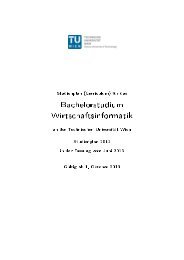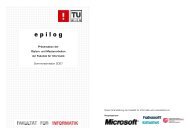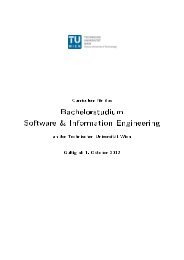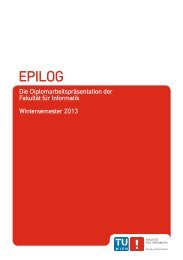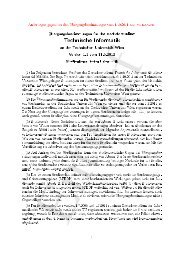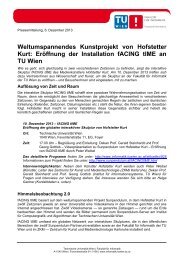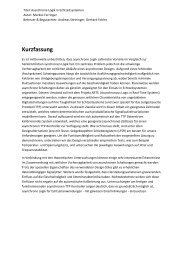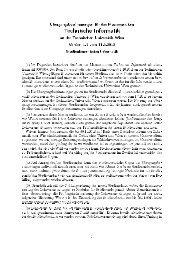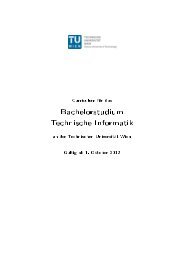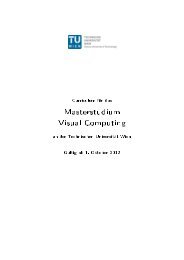Masterstudium Business Informatics - Fakultät für Informatik, TU Wien
Masterstudium Business Informatics - Fakultät für Informatik, TU Wien
Masterstudium Business Informatics - Fakultät für Informatik, TU Wien
You also want an ePaper? Increase the reach of your titles
YUMPU automatically turns print PDFs into web optimized ePapers that Google loves.
implement solutions. Topics are presented in lectures, exercises are done and presented<br />
by students, larger problems are solved and implemented by students in the lab.<br />
FMF/QOM - Quantative Operations Management (6.0 Ects) This module deals<br />
with quantitative methods used in operations management as well as with decision<br />
analysis by mathematical models and econometric methods. Theoretical background<br />
is assessed by periodic exams. To adopt the skills, students work out examples and case<br />
studies, in class as well as at home.<br />
Fachübergreifende Qualikationen (4.5 Ects) Die Lehrveranstaltungen dieses Moduls<br />
dienen dem Erwerb fachübergreifender Qualikationen wie zum Beispiel: Verhandlungsführung,<br />
Präsentation- und Kommunikationstechnik, systematische Recherche und<br />
Planung, Koniktmanagement, Teamfähigkeit und Führung, Organisation und Management,<br />
Betriebsgründung und Finanzierung, Verständnis rechtlicher Rahmenbedinungen,<br />
Verbesserung von Fremdsprachenkenntnissen.<br />
Freie Wahl (max. 4.5 Ects) Die Lehrveranstaltungen dieses Moduls dienen der Vertiefung<br />
des Faches sowie der Aneignung auÿerfachlicher Kenntnisse, Fähigkeiten und<br />
Kompetenzen.<br />
INT/ASE - Advanced Software Engineering (6.0 Ects) This module builds on the<br />
foundation of knowledge from the bachelor module to deepen selected software engineering<br />
approaches for the development and evolution of advanced software systems. The<br />
focus is on technical software engineering approaches, such as component-based software<br />
engineering and software process automation, for evolving advanced software systems in<br />
distributed engineering teams. The module consists of project work in a small group<br />
over the course of a semester, in which a medium-size software engineering project is<br />
conducted with the goal of a usable and useful prototype with associated systematic<br />
documentation and the use of selected advanced software technologies.<br />
INT/MEN - Model Engineering (6.0 Ects) This module places software models as<br />
the central artifact in software development. Thus, model engineering aims for modeldriven<br />
software development closing the gap between modeling and programming. In this<br />
context, concepts and techniques of transformation engineering, language engineering,<br />
and model management are taught. The module includes lectures and labs. The content<br />
of the lecture is deepened in practical exercises, which are solved in small groups.<br />
Innovation Implementation (6.0 Ects) This is the third module out of four. It focuses<br />
on the implementation of innovations. It comprises practical aspects such as legal, nancial,<br />
and social issues, which are complementary to and often critical for the innovation<br />
process.<br />
Innovation Planning (6.0 Ects) This is the second module out of four. Students will<br />
learn to formulate business plans, as well as to discuss selected innovation cases.<br />
Innovation Practice (12.0 Ects) This is the fourth and last module. Within a project,<br />
students will work on a concrete innovation task.<br />
Innovation and Creativity (6.0 Ects) This is the rst module out of four, as such<br />
it represents the entry point to the innovation modules. Students should have interest<br />
11



